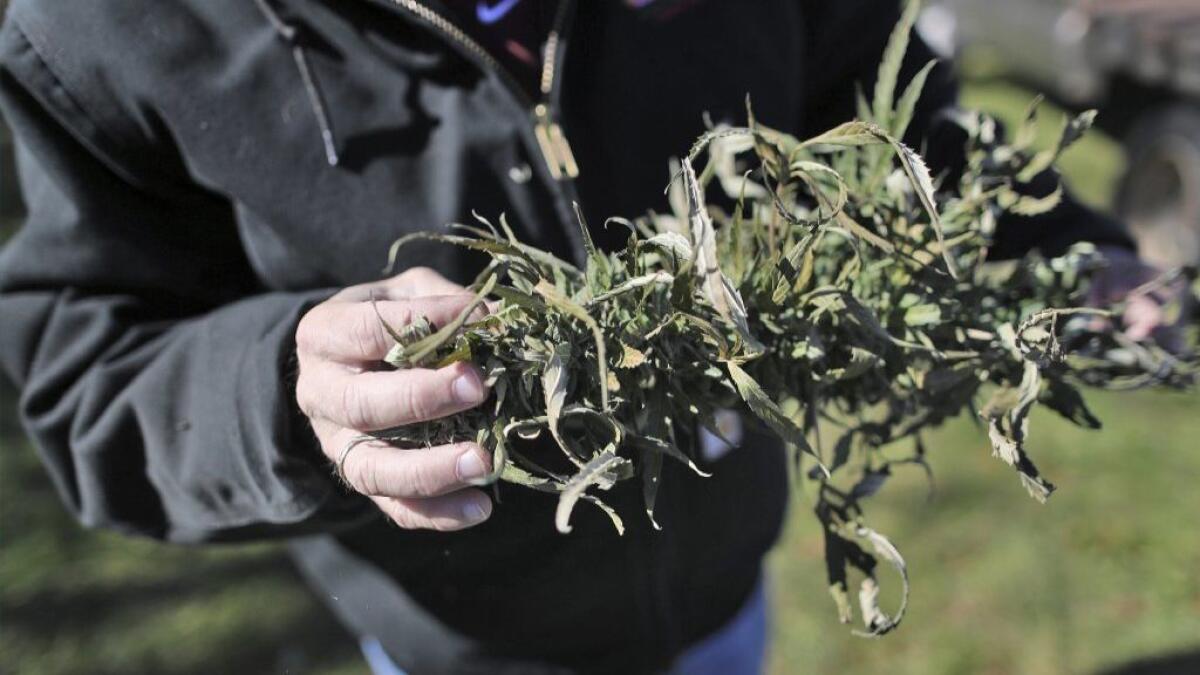Q&A: Hemp is about to be legal under the 2018 farm bill. You can’t get high from it — but you can wear it

- Share via
Hemp — a close relative of marijuana that can be used to make textiles and other products — has long been classified as a Schedule I drug by the federal government. That’s set to change.
President Trump is soon expected to sign a farm bill that includes a section that legalizes the commercial cultivation of hemp nationwide.
The bill, years in the making, comes as public support for cannabis legalization has increased over the years, offering a cover of sorts to politicians who see the potential for boosting state tax revenue.
Here’s a look at the movement to legalize hemp and whether it could open the way to lifting the federal prohibition on marijuana.
First, what is hemp exactly?
Hemp, like marijuana, is a form of cannabis.
The two plants look similar, with an important difference. Marijuana produces a flower — the sticky buds filled with THC, the chemical compound that creates a high when smoked or ingested. Hemp does not produce high levels of THC.
Instead, it is prized for its stalks, which contain fiber that can be used to make rope and fabric for clothing.
Its cultivation dates back to 8000 B.C. — and ancient Mesopotamia — and is believed to be among the oldest examples of human industry.
But hemp has been illegal in the United States?
Yes.
Since 1970, when President Nixon launched the so-called war on drugs by signing the Controlled Substances Act, drug laws have made no distinction between hemp and marijuana when it comes to cultivation.
Both are classified as Schedule I drugs on the Drug Enforcement Administration’s list of controlled substances, alongside heroin and LSD.
Over the years, this has led to misinformation about hemp. Earlier this year, Sen. Ron Wyden (D-Ore.) summed up the bad news for anybody who tries to get high on hemp.
“Federal law treats hemp like it’s a dangerous drug, but the only thing you’re going to accomplish by smoking hemp is wasting breath, time and lighter fluid,” he tweeted.
But haven’t I seen hemp products for sale in U.S. stores?
Yes.
Hemp-derived products — T-shirts and soaps — have been legal for decades and are part of a growing market that the Hemp Business Journal estimated hit $820 million in sales last year.
Those products, or at least the hemp in them, have come from abroad. China and Canada are two of the largest growers and exporters.
U.S. restrictions on growing hemp began to loosen in 2014, when President Obama signed a farm bill that allowed universities and state departments of agriculture to begin cultivating it for limited purposes, such as research exploring the best uses for the plant.
Since then, nearly 40 states — including California — have passed laws that allow for hemp cultivation and production programs.
This year, five states — Alaska, Arizona, Kansas, Missouri and Oklahoma — passed hemp research legislation, according to the National Conference of State Legislatures.
In contrast to its opposition to marijuana legalization and its threats to shut down state-approved pot businesses, the federal government has not challenged state efforts on hemp.
Hemp companies and farmers alike have been lobbying to end the federal prohibition.
So now it’s legal under federal law too?
It will be, assuming Trump signs the new farm bill.
Passed by Congress this month with bipartisan support, the bill defines hemp as an agricultural commodity and removes its status as an illegal drug.
The bill also eliminates “hemp” from the definition of marijuana under the Controlled Substances Act and creates an exemption for the small amount of THC found in hemp.
In addition, the legislation authorizes the U.S. Department of Agriculture to create quality control standards for commercial hemp production and gives states, U.S. territories and tribes the ability to adopt their own plans.
“This is a pivotal moment for hemp in America and it is long overdue,” said Shawn Hauser, a Denver-based attorney who helps marijuana and hemp businesses navigate state and federal laws. “Following decades of prohibition under outdated drug laws, hemp will finally be treated like other crops and legal for U.S. farmers to grow.”
The new law does not allow people to grow their own hemp plants.
Why did Congress decide to act now?
It’s simple: pressure from constituents.
Legalizing hemp had bipartisan support in Congress, especially among lawmakers from areas where agriculture is an economic engine.
For years, Republican Mitch McConnell, the Senate majority leader, had faced pressure from farmers in his home state of Kentucky to legalize hemp production to help counter declining demand for tobacco and other crops.
The state’s research program, passed by the Legislature in 2016, has studied the environmental benefit of hemp and the potential use of the plant as an energy source or biofuel.
McConnell said the passage of the farm bill is a “bright spot” because hemp will be legal.
“At a time when farm income is down and growers are struggling, industrial hemp is a bright spot of agriculture’s future,” McConnell tweeted recently. “My provision in the Farm Bill will not only legalize domestic hemp, but it will also allow state departments of agriculture to be responsible for its oversight.”
Is everyone happy about the hemp provision in the farm bill?
No.
Language in the farm bill prohibits felons from working in the hemp industry until 10 years after their conviction. That doesn’t sit well with advocates pushing to make criminal justice reform a centerpiece of cannabis legalization.
“A 10-year wait will effectively bar many people from contributing to this new industry,” said Grant Smith, deputy director of national affairs with the Drug Policy Alliance. “This is a setback for efforts to help formerly incarcerated people get back on their feet, and the ban only reinforces the false notion that hemp needs to be treated differently than any other agricultural commodity, a belief that McConnell and hemp advocates have worked so hard to dispel.”
Does this mean there’s any hope for marijuana legalization?
Not necessarily.
Though members of Congress, mostly Democrats, have floated the idea of legalization at the federal level, and Sen. Cory Booker (D-N.J.) even introduced legislation to lift the prohibition, it hasn’t gained traction.
The legalization movement, however, remains active at the state level.
Since 2012, when Colorado and Washington became the first states to legalize marijuana for recreational use, 10 others have followed suit. California did it in 2016. The most recent, Michigan, legalized recreational pot in November.
With the exception of Vermont, which legalized with a vote in the state Legislature, all enacted their laws through ballot measures.
More to Read
Sign up for Essential California
The most important California stories and recommendations in your inbox every morning.
You may occasionally receive promotional content from the Los Angeles Times.












